| Listing 1 - 10 of 14 | << page >> |
Sort by
|
Periodical
Year: 2001 Publisher: Iowa City, Ia. : University of Iowa
Abstract | Keywords | Export | Availability | Bookmark
 Loading...
Loading...Choose an application
- Reference Manager
- EndNote
- RefWorks (Direct export to RefWorks)
An interdisciplinary journal of rhetorical analysis and invention in all fields of learning.
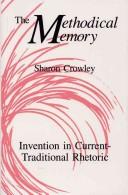
ISBN: 1280698136 9786613675095 0809385937 9780809385935 9781280698132 0809330016 9780809330010 0809316153 Year: 2010 Publisher: Carbondale, Ill. Southern Illinois University Press
Abstract | Keywords | Export | Availability | Bookmark
 Loading...
Loading...Choose an application
- Reference Manager
- EndNote
- RefWorks (Direct export to RefWorks)
In this first sustained critique of current-traditional rhetorical theory, Sharon Crowley uses a postmodern, deconstructive reading to reexamine the historical development of current-traditional rhetoric. She identifies it (as well as the British new rhetoric from which it developed) as a philosophy of language use that posits universal principles of mind and discourse. Crowley argues that these philosophies are not appropriate bases for the construction of rhetorical theories, much less guides for the teaching of composition.
Book
ISBN: 1469639246 9781469639246 Year: 2017 Publisher: Chapel Hill University of North Carolina
Abstract | Keywords | Export | Availability | Bookmark
 Loading...
Loading...Choose an application
- Reference Manager
- EndNote
- RefWorks (Direct export to RefWorks)
Invention (Rhetoric) --- French drama --- Rhetoric --- History --- History and criticism.
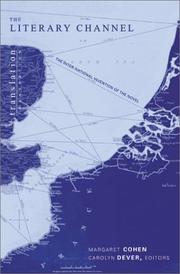
ISBN: 0691050023 0691050015 9786612696060 1282696068 1400829518 9781400829514 9780691050027 9780691050010 9781282696068 6612696060 Year: 2002 Publisher: Princeton, N.J. Princeton University Press
Abstract | Keywords | Export | Availability | Bookmark
 Loading...
Loading...Choose an application
- Reference Manager
- EndNote
- RefWorks (Direct export to RefWorks)
The Literary Channel defines a crucial transnational literary "zone" that shaped the development of the modern novel. During the first two centuries of the genre's history, Britain and France were locked in political, economic, and military struggle. The period also saw British and French writers, critics, and readers enthusiastically exchanging works, codes, and theories of the novel. Building on both nationally based literary history and comparatist work on poetics, this book rethinks the genre's evolution as marking the power and limits of modern cultural nationalism. In the Channel zone, the novel developed through interactions among texts, readers, writers, and translators that inextricably linked national literary cultures. It served as a forum to promote and critique nationalist clichés, whether from the standpoint of Enlightenment cosmopolitanism, the insurgent nationalism of colonized spaces, or the non-nationalized culture of consumption. In the process, the Channel zone promoted codes that became the genre's hallmarks, including the sentimental poetics that would shape fiction through the nineteenth century. Uniting leading critics who bridge literary history and theory, The Literary Channel will appeal to all readers attentive to the future of literary studies, as well as those interested in the novel's development, British and French cultural history, and extra-national patterns of cultural exchange. Contributors include April Alliston, Emily Apter, Margaret Cohen, Joan DeJean, Carolyn Dever, Lynn Festa, Françoise Lionnet, Deidre Shauna Lynch, Sharon Marcus, Richard Maxwell, and Mary Helen McMurran.
Fiction --- Invention (Rhetoric). --- History and criticism. --- Invention (Rhetoric) --- Rhetoric --- Comparative literature --- French literature --- English literature --- History and criticism --- E-books
Book
ISBN: 1501732676 150172732X 9781501727320 Year: 2018 Publisher: Ithaca, NY
Abstract | Keywords | Export | Availability | Bookmark
 Loading...
Loading...Choose an application
- Reference Manager
- EndNote
- RefWorks (Direct export to RefWorks)
In a book that draws attention to some of our most familiar and unquestioned habits of thought-from "framing" to "perspective" to "reflection"-Rayna Kalas suggests that metaphors of the poetic imagination were once distinctly material and technical in character. Kalas explores the visual culture of the English Renaissance by way of the poetic image, showing that English writers avoided charges of idolatry and fancy through conceits that were visual, but not pictorial. Frames, mirrors, and windows have been pervasive and enduring metaphors for texts from classical antiquity to modernity; as a result, those metaphors seem universally to emphasize the mimetic function of language, dividing reality from the text that represents it. This book dissociates those metaphors from their earlier and later formulations in order to demonstrate that figurative language was material in translating signs and images out of a sacred and iconic context and into an aesthetic and representational one. Reading specific poetic images-in works by Spenser, Shakespeare, Gascoigne, Bacon, and Nashe-together with material innovations in frames and glass, Kalas reveals both the immanence and the agency of figurative language in the early modern period.Frame, Glass, Verse shows, finally, how this earlier understanding of poetic language has been obscured by a modern idea of framing that has structured our apprehension of works of art, concepts, and even historical periods. Kalas presents archival research in the history of frames, mirrors, windows, lenses, and reliquaries that will be of interest to art historians, cultural theorists, historians of science, and literary critics alike. Throughout Frame, Glass, Verse, she challenges readers to rethink the relationship of poetry to technology.
Renaissance --- Invention (Rhetoric) --- Mirrors in literature. --- Poetics --- Frame-stories --- English poetry --- Rhetoric --- History --- History and criticism.
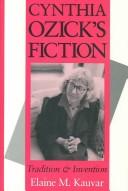
ISBN: 0585001189 9780585001180 0253331293 9780253331298 Year: 1993 Publisher: Bloomington Indian University Press
Abstract | Keywords | Export | Availability | Bookmark
 Loading...
Loading...Choose an application
- Reference Manager
- EndNote
- RefWorks (Direct export to RefWorks)
Cynthia Ozick's emphasis on tradition has made her, paradoxically, one of the most innovative writers of our time. Elaine M. Kauvar illuminates the intricacies of Ozick's texts, explores the dynamics of her creativity, and excavates her sources, contexts, and allusions. She provides readings of all of Ozick's fiction, from her first published novel, Trust, through The Messiah of Stockholm. Working chronologically, Kauvar traces the development of the storyteller's thought and art, examines the themes that pervade Ozick's tales - the battle between Hebraism and Hellenism, the lure of paganism and the dangers of idolatry, the implications and consequences of assimilation, the perplexities of the artist and the besetting dangers of art - and demonstrates the dialectic existing between her tales, their shifting perspectives, and competing ideas. Precisely because Ozick draws on the resources in her heritage, Kauvar concludes, she transcends narrow categories and defies rigid ideologies.
Jews in literature. --- Women and literature --- Influence (Literary, artistic, etc.) --- Jewish women --- Invention (Rhetoric) --- Rhetoric --- History --- Intellectual life. --- Ozick, Cynthia --- אוזיק, סינתיה --- Criticism and interpretation.
Book
ISBN: 9780809390854 080939085X Year: 1986 Publisher: Carbondale Southern Illinois University Press
Abstract | Keywords | Export | Availability | Bookmark
 Loading...
Loading...Choose an application
- Reference Manager
- EndNote
- RefWorks (Direct export to RefWorks)
Report writing --- English language --- Invention (Rhetoric) --- Research paper writing --- Research report writing --- Term paper writing --- Authorship --- Rhetoric --- Study and teaching --- Social aspects. --- Germanic languages
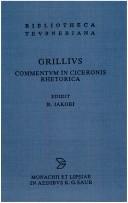
ISBN: 3598712308 3110960494 9783110960495 9783598712302 Year: 2002 Publisher: München Saur
Abstract | Keywords | Export | Availability | Bookmark
 Loading...
Loading...Choose an application
- Reference Manager
- EndNote
- RefWorks (Direct export to RefWorks)
Ciceros Schrift De inventione, die in der Antike unter dem Titel Rhetorica verbreitet war, ist in Antike und Mittelalter das meist benutzte Lehrbuch zur Rhetorik gewesen (über 1500 Hss. sind noch erhalten). Gelesen wurde die Schrift stets mit 2 Kommentaren des 4. nachchristlichen Jhdt.s, der Exegese des Victorinus und der des Grillius. Die Erstedition des nur teilweise erhaltenen Grillius erfolgte 1927 durch J. Martin. Diese Edition basierte auf unzureichender Kenntnis und fehlerhafter Auswertung der handschriftlichen Überlieferung. Die neue Ausgabe, die auf einer erstmaligen Recensio der direkten wie indirekten Überlieferung beruht, unterscheidet sich wie kaum eine andere Teubneriana von einer Vorgängeredition: Die Neuordnung der Überlieferung fördert auf jeder Seite zahlreiche bisher unbekannte oder mißachtete Lesarten zu Tage, so daß de facto ein völlig neuer Text geboten wird, der, befreit von mittelalterlichen Zusätzen und Konjekturen, das Orignal wiedergewinnt.
Rhetoric, Ancient. --- Rhétorique ancienne --- Cicero, Marcus Tullius. --- Commentaries. --- Invention (Rhetoric) --- Ancient rhetoric --- Classical languages --- Greek language --- Greek rhetoric --- Latin language --- Latin rhetoric --- Rhetoric
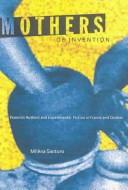
ISBN: 1282860518 9786612860515 0773570268 9780773570269 9781282860513 6612860510 0773523731 9780773523739 9780773524873 0773524878 Year: 2002 Publisher: Montréal Ithaca McGill-Queen's University Press
Abstract | Keywords | Export | Availability | Bookmark
 Loading...
Loading...Choose an application
- Reference Manager
- EndNote
- RefWorks (Direct export to RefWorks)
Santoro elucidates notoriously difficult works by the four "mothers of invention" studied - Cixous and Hyvrard from France, and Gagnon and Brossard from Quebec - showing how the rethinking of images associated with femininity and motherhood, a disruptive approach to language, and a subversive relation to novelistic conventions characterize these writers' search for a writing that will best express women's desires and dreams. Mothers of Invention situates such ideologically motivated textual practices within the avant-garde tradition, even as it suggests how women's experimental writings collectively transform our understanding of that tradition. Santoro makes clear the shared ethical and aesthetic commitments that nourished a transatlantic community whose contribution to mainstream literature and cultural productions, including postmodernism, is still being felt today.
Feminist fiction, French --- Experimental fiction, French --- French fiction --- History and criticism. --- Women authors --- French-Canadian fiction --- Experimental fiction, French-Canadian --- Invention (Rhetoric) --- Feminist fiction --- History
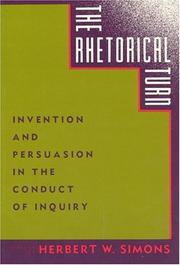
ISBN: 0226759024 0226759016 9786613054906 0226759032 1283054906 9780226759036 9781283054904 6613054909 9780226759012 9780226759012 9780226759029 Year: 1990 Publisher: Chicago, Ill. University of Chicago Press
Abstract | Keywords | Export | Availability | Bookmark
 Loading...
Loading...Choose an application
- Reference Manager
- EndNote
- RefWorks (Direct export to RefWorks)
We have only recently started to challenge the notion that "serious" inquiry can be free of rhetoric, that it can rely exclusively on "hard" fact and "cold" logic in support of its claims. Increasingly, scholars are shifting their attention from methods of proof to the heuristic methods of debate and discussion-the art of rhetoric-to examine how scholarly discourse is shaped by tropes and figures, by the naming and framing of issues, and by the need to adapt arguments to ends, audiences, and circumstances. Herbert W. Simons and the contributors to this important collection of essays provide impressive evidence that the new movement referred to as the rhetorical turn offers a rigorous way to look within and across the disciplines. The Rhetorical Turn moves from biology to politics via excursions into the rhetorics of psychoanalysis, decision science, and conversational analysis. Topics explored include how rhetorical invention guides scientific invention, how rhetoric assists political judgment, and how it integrates varying approaches to meta-theory. Concluding with four philosophical essays, this volume of case studies demonstrates how the inventive and persuasive dimensions of scholarly discourse point the way to forms of argument appropriate to our postmodern age.
Literary rhetorics --- Theory of knowledge --- #KVHA:Taalkunde --- #KVHA:Retoriek --- Invention (Rhetoric) --- Persuasion (Rhetoric) --- Invention (Rhetoric). --- Persuasion (Rhetoric). --- Rhetoric --- Forensics (Public speaking) --- Oratory --- inquiry, rhetoric, persuasion, invention, audience, communication, speech, linguistics, logic, proof, evidence, debate, discussion, discourse, naming, framing, argument, biology, politics, psychoanalysis, decision science, conversations, innovation, meta theory, judgment, ethics, darwin, taxonomy, knowledge, expertise, conversion, values, machiavelli, move report, realism, relativism, dualism, positivism, romanticism, nonfiction, academia.
| Listing 1 - 10 of 14 | << page >> |
Sort by
|

 Search
Search Feedback
Feedback About UniCat
About UniCat  Help
Help News
News